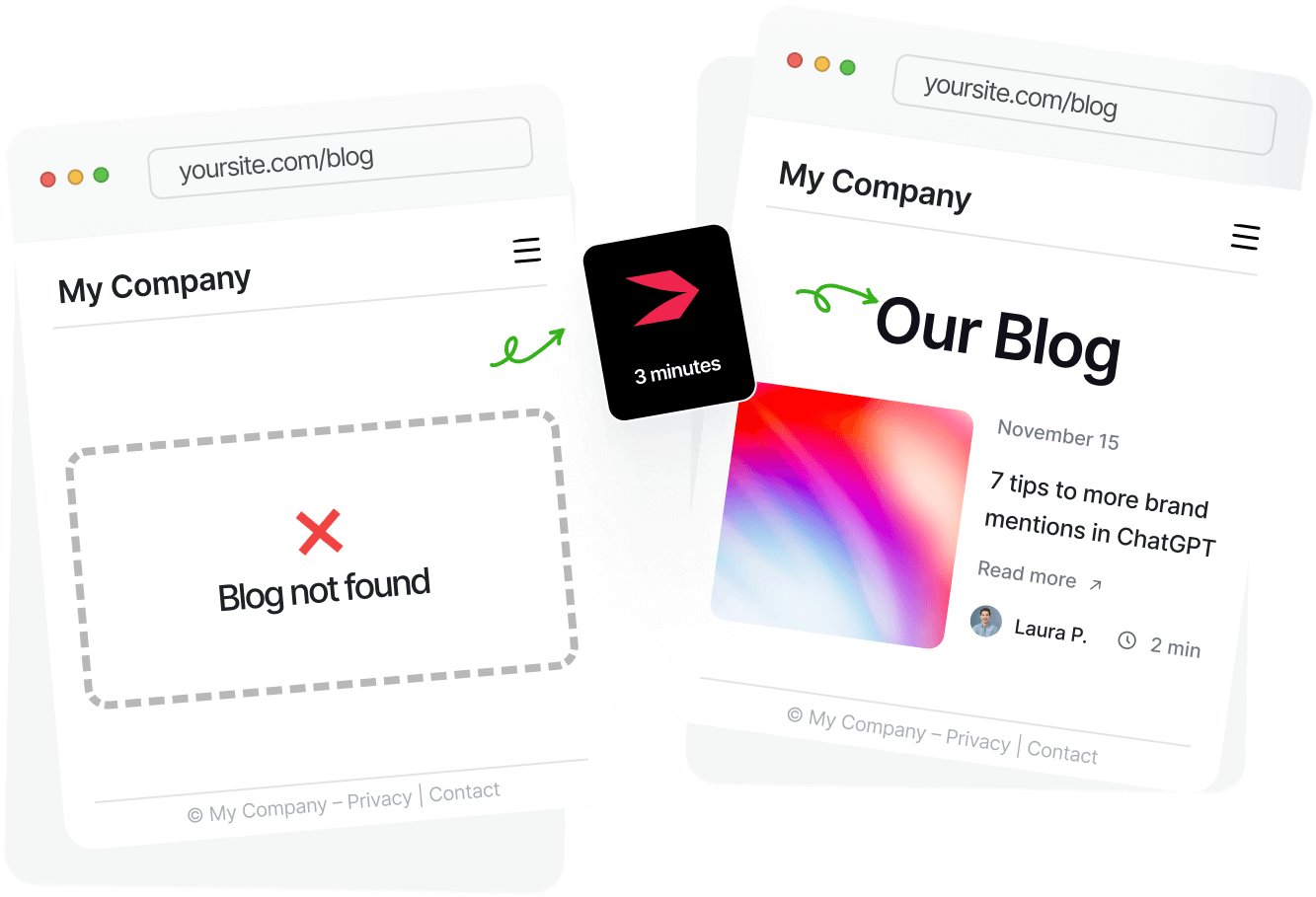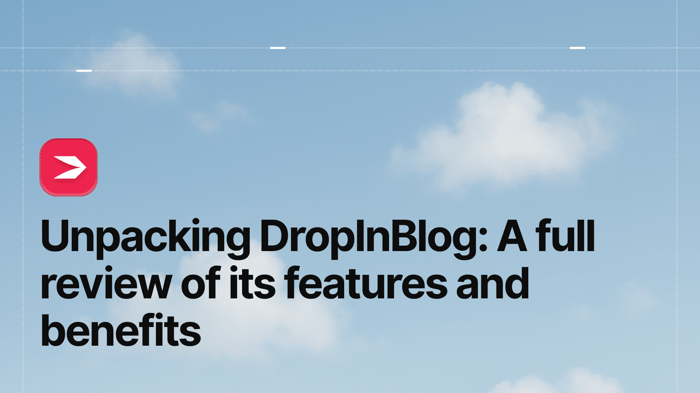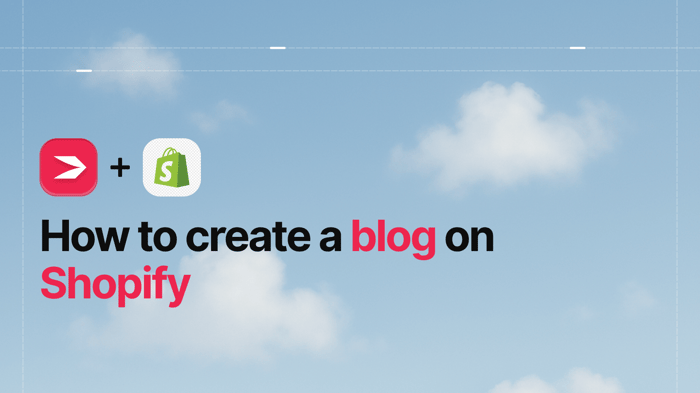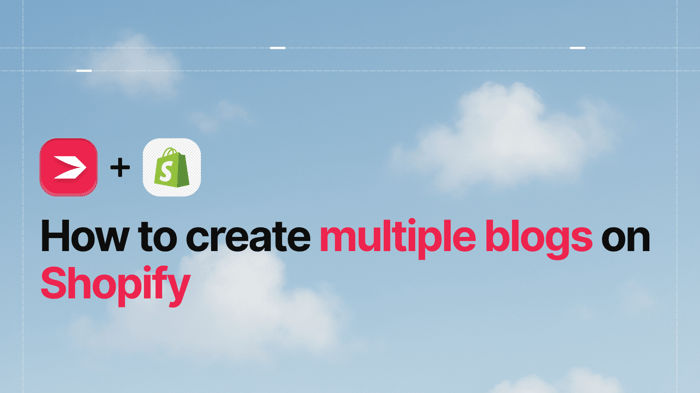Both Shopify and ClickFunnels are leaders in e-commerce, but they function in very different ways. Our Shopify vs. ClickFunnels comparison will give you all the details you need to know.
Firstly, the key difference between Shopify and ClickFunnels is the core purpose of the platform. Shopify is a generalist e-commerce platform giving users the ability to build, manage, and market their online store all from one place. On the other hand, ClickFunnels was primarily designed for building sales funnels and maximizing conversion rates.
But don’t worry, we’ll go into the finer points in this blog post to help you make a decision as to which platform is better for your business needs.
A quick Shopify vs. ClickFunnels comparison:
| Shopify | ClickFunnels | |
| Pricing |
|
|
| Site Builder |
|
|
| Features |
|
|
| Blogging |
|
|
| Integrations |
|
|
| Customer Support |
|
|
Table of Contents
Pricing
Shopify
Shopify provides users with three standard pricing options as well as a couple of special plans. Then there’s an enterprise-level plan for those that need more capacity and a customized solution.
Shopify doesn’t offer a free plan and there is no longer a 14-day free trial. The only trial available gives you just three days to explore and make a decision.
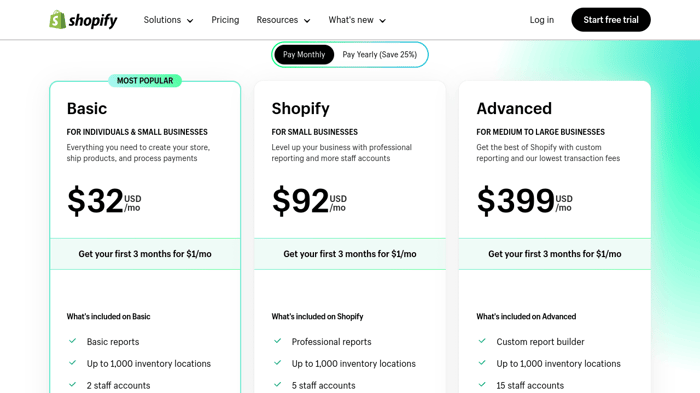
Basic Plan
The Basic plan costs $32/month or $288/year, which is the equivalent to $24/month. Most people would consider the Basic plan a good starting point that you can upgrade from if you need to. This plan gives you two staff accounts and all the functionality you need to sell and market your products.
Shopify Plan
The next plan is the Shopify plan which costs $92/month or $828/year ($69/month). This plan gives you five staff accounts and improved site performance reporting. For the price increase, there aren’t many additional features or functionality with this plan.
Advanced Plan
The Advanced plan is a significant price increase, costing $399/month or $3,588/year ($299/month). Of course, it’s tailored towards large businesses that have the budget and want the additional features. This plan gives you 15 staff accounts, advanced website performance reporting, and you can add a tax estimate at the checkout.
Additional Pricing Options
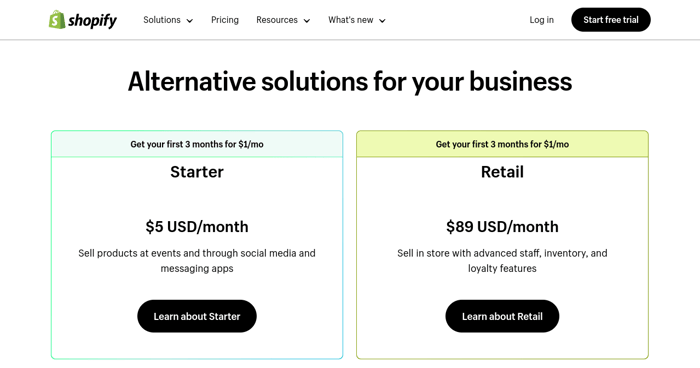
For those who don’t want or need a full e-commerce plan, there is another option. The Starter plan costs just $5/month and gives you the functionality you need to sell only on social media platforms.
Then there is the Retail plan for $89/month, which allows for a simple online store but is aimed at brick-and-mortar stores selling physical products. The unlimited POS logins for all your staff is a nice feature.
Enterprise Pricing
Shopify Plus starts at $2,000/month but is a customized solution to suit any size business and is designed to scale as required. Major brands like Heinz, Tesla, and Decathlon are Shopify Plus customers, so it’s obvious this plan has the capacity for big enterprises.
ClickFunnels
ClickFunnels has three pricing plans on offer, and all three plans allow for unlimited courses, workflows, pages, products, and email automation. However, they are significantly more expensive than the options Shopify provides.
There is no free plan option with ClickFunnels either, but it does offer a 14-day free trial. So, you’ll have plenty of time to assess all the features and find your feet before committing to a payment plan.
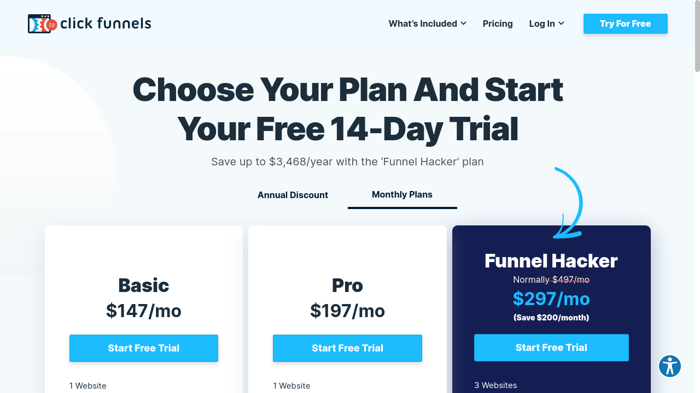
Basic Plan
In comparison to the lowest-tier pricing option that Shopify offers, ClickFunnels is far more expensive. The Basic plan will cost you $147/month or $1,524/year, which is the equivalent to $127/month. For that, you’ll get the ability to build one website with one domain and 20 funnels. It also gives access to three users, and you can have up to 10,000 contacts.
Pro Plan
The Pro plan gives you all the same features as the Basic plan but with some extra additions. For $197/month or $1,884/year ($157/month) you can build one website and 100 sales funnels, connect five users, and have three domains. This plan also allows for up to 25,000 contacts and gives API access, which the Basic plan does not.
Funnel Hacker Plan
The Funnel Hacker plan is tailor-made for big business. It allows you to build unlimited sales funnels and connect up to 15 users. For $297/month or $2,496/year ($208/month), you can have three websites, nine domains, 200,000 contacts, and all the other features available with the Pro plan.
Site Builder
Shopify
The Shopify site builder is easy to use and navigate, and generally offers a simple but effective solution. The drag-and-drop editor is a favorite, and there’s a reasonable selection of customizable and responsive templates available – some are even free of charge.
Each theme will vary in terms of the customization options and also the language translation options you have. Some themes may not allow for the layout you want, so customizing beyond the limits of what the theme allows means you’ll need to code.
Shopify has managed to find the balance between ease of use and having enough features and functionality, although it is heavily reliant on integrations.
ClickFunnels
Although ClickFunnels is focused on creating sales funnels and landing pages, the newest edition, ClickFunnels 2.0, allows you to build an online storefront as well. Similar to Shopify, it also has a drag-and-drop style editor and a large collection of templates to help in the process. However, you’ll only find landing page and sales funnel templates on their marketplace. Overall the site builder is intuitive and easy to use, even for someone with no experience.
With a site built within ClickFunnels it means you’ll be able to send leads from your landing pages and funnels straight back to your e-commerce site. This means you can avoid the hassle of having to use another platform to build your site on.
Features
Shopify
Shopify is set up and ready to go with all the baseline features you’ll need. You can manage your inventory, orders, shipping, and returns easily. There’s a free SSL certificate to guarantee the security of your site, and it supports a wide range of payment gateways. However, if you stick with Shopify Payments, you won’t pay any transaction fees. With the highest-tier plan, you can estimate shipping taxes at the checkout, which avoids the issue of delayed parcels due to import tax problems.
It also allows you to develop your own discount codes and gift cards to selectively offer to customers to build loyalty and ensure repeat business. Additionally, you can sell your products across a variety of platforms, including social media, other marketplaces like Amazon, or even in physical brick-and-mortar stores.
Shopify includes built-in SEO tools and features for marketing, such as email marketing and abandoned cart recovery. The bonus is that all of these can be automated to help with time management. When you’re done building your site and automating workflows, you have Shopify site analytics included. Just keep in mind that it’s sometimes recommended to integrate your preferred app for more detailed analytics.
ClickFunnels
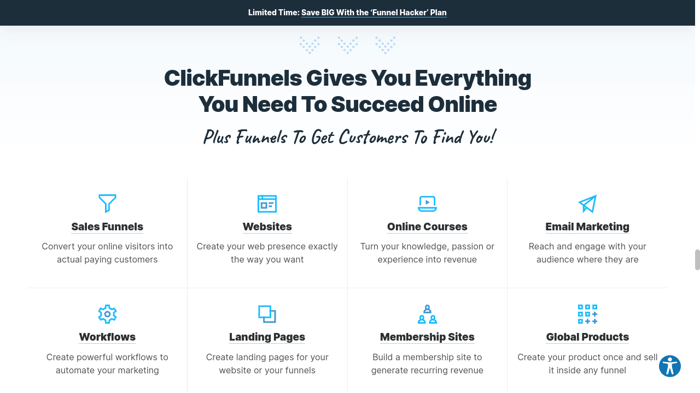
ClickFunnels has streamlined the funnel-building process, however, it’s jam-packed with functionality and can be a little overwhelming to get your head around.
You can develop different types of websites, including membership sites that allow for secure members-only pages. You can even develop and sell your own courses and learning materials. ClickFunnels has course-building templates to make this much easier, and you can set your content to “drip,” or release on a certain schedule.
In the marketing space, you don’t need to integrate an email marketing solution because ClickFunnels has a pretty decent one included. It also includes A/B testing, which allows you to easily split-test different elements of your funnels to optimize conversion rates and improve performance. If you want to engage in affiliate marketing, you can. ClickFunnels allows you to set up affiliate programs and manage affiliates who promote your products or funnels.
On top of all this, ClickFunnels allows you to easily monitor the performance of your funnels with powerful analytics and tracking tools.
Blogging
Both Shopify and ClickFunnels offer built-in blogging functionality, but don’t get too excited just yet. They each have some limitations that might leave you searching for a better option.
Shopify
The Shopify blogging tool is good, but not great. In general, it appeals to those who find the convenience of a built-in blogging tool more appealing. But, it doesn’t give you full SEO functionality, which is a bit of a problem.
An ideal alternative is DropInBlog. DropInBlog gives you all the SEO functionality and more, plus it’s super easy to manage all your content. You simply develop a blog post, check that it achieves the desired SEO score with the SEO Analyzer, and hit publish. The blog post will immediately go live on your selected blog page. The best part is you can find DropInBlog in the Shopify App Store.
ClickFunnels
The new ClickFunnels 2.0 comes with a built-in blogging tool, much to everyone's delight. The tool is automatically included with your plan, and it has a similar text editor to WordPress. It allows you to create blog categories and tags, add different authors, and edit the meta title and meta description.
However, it lacks the SEO tools that DropInblog has, which means you won’t know if your content is optimized correctly.
Integrations
Shopify
Shopify has a very organized app store with over 8,000 apps to choose from, so you’re bound to find the functionality you need. The app store has everything sorted by function so it’s easy to browse, or you can search with the search bar.
You’ll also find some helpful how-to articles linked to each category of apps to help you get the most out of your integrations.
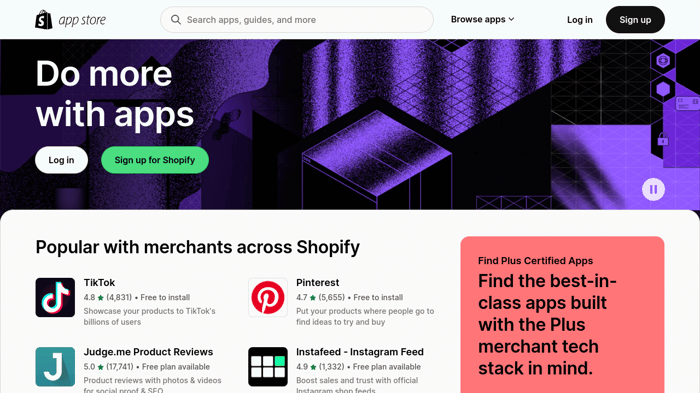
ClickFunnels
Although ClickFunnels does come feature-packed, if you want to use a specific app, it’s usually possible to integrate it. However, it doesn’t have a clear integrations page, which is a little confusing. It certainly isn’t as well put together as the Shopify app store, that’s for sure.
You can integrate ClickFunnels with major apps like Twilio, GoToWebinar, ShipStation, Zapier, and, interestingly enough – Shopify.
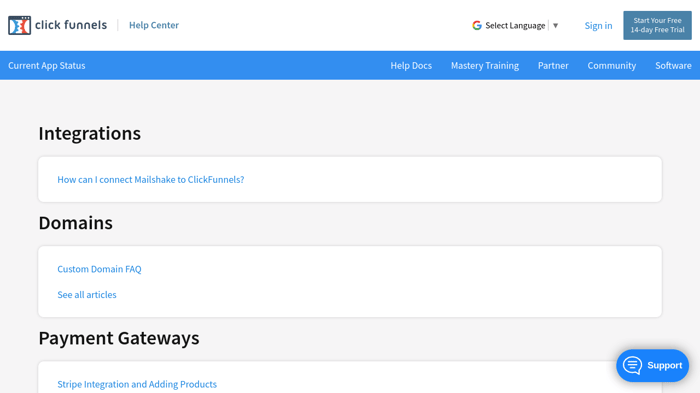
Customer Support
Shopify
Shopify is highly rated for the customer support it provides but also for the learning materials available. Shopify is so popular that not only does it provide a wide range of courses in the Shopify Academy, but you can also find independent learning materials online.
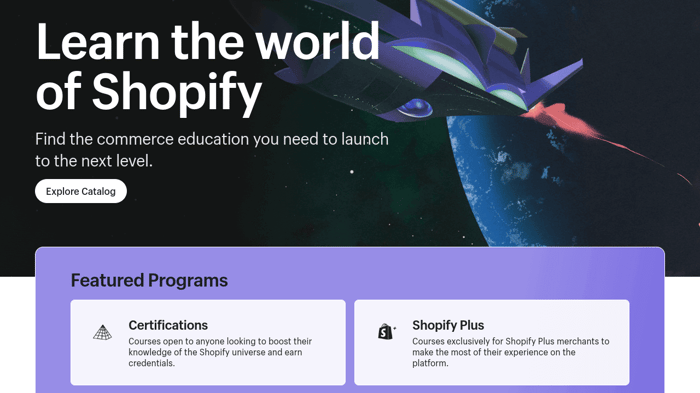
Customer support is available in the form of live chat, email, or phone and is for all plan holders. The assistance provided is well regarded too. Alternatively, you can find answers to your questions in the help center, community forum, or through any of their social media channels.
ClickFunnels
ClickFunnels only provides support in two ways – live chat or email. Email support is available 24/7 and they claim to always reply within 1-2 hours during business hours. The live chat is available Monday to Friday only, but it is available for 24 hours on these days.
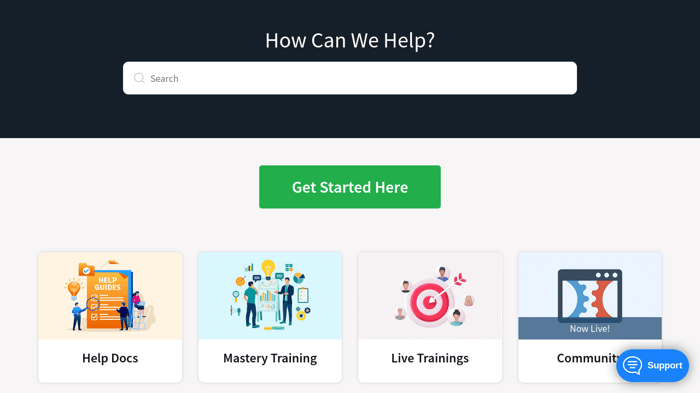
The ClickFunnels help center is very well-stocked with training programs, product documentation, and learning guides. It’s certainly easier to navigate than their integrations page. They also have a community forum, or you can access community support through their social media platforms.
FAQs
Which is more beginner-friendly, Shopify or ClickFunnels?
Shopify is definitely the more beginner-friendly of the two platforms. Shopify was built with ease of use in mind for anyone just starting out with e-commerce. In comparison, ClickFunnels is loaded with features, which is great, but it can make for a slow learning process.
Which is better for e-commerce, Shopify or ClickFunnels?
It depends entirely on what you need to achieve. Shopify is great for beginners and experienced sellers alike but it doesn’t have the ability to build sales funnels. ClickFunnels is possibly the champion of sales funnels and landing pages.
Do I need to have a separate website if I use ClickFunnels?
With the new ClickFunnels 2.0 edition it’s possible to build a website. Prior to ClickFunnels 2.0, you could only build sales funnels and landing pages that would redirect to your website, and that had to be built on a separate platform.
Final Thoughts
Shopify is primarily an e-commerce platform designed for building and managing online stores. It offers a wide range of customizable templates, robust inventory management, and payment processing options. You’ll get unlimited contacts, website templates, shipping and product management tools, and a POS option – all aspects that ClickFunnels lacks.
ClickFunnels, on the other hand, is primarily a sales funnel builder. It's geared towards businesses and entrepreneurs who want to create high-converting sales funnels, landing pages, and marketing automation sequences. ClickFunnels excels at lead generation and sales optimization but lacks some of the comprehensive e-commerce features offered by Shopify.
At the end of this Shopify vs. ClickFunnels comparison we'd summarise by saying that Shopify is ideal for businesses looking to establish a comprehensive online store, while ClickFunnels is better suited for those focused on creating sales funnels and optimizing the customer journey. We recommend you carefully consider what features you’re looking for before opting for one or the other.

